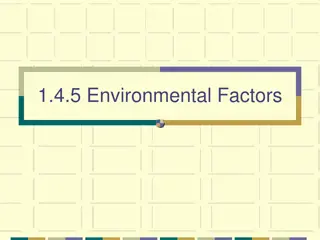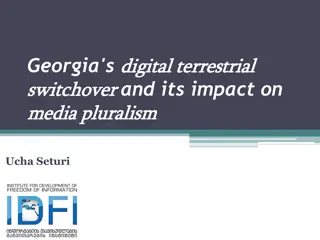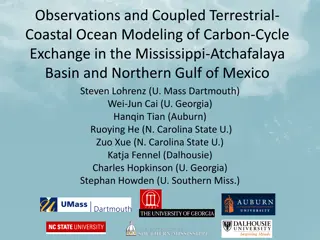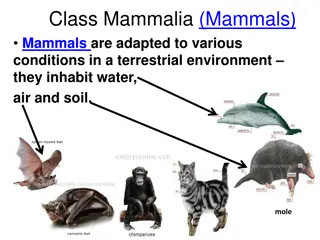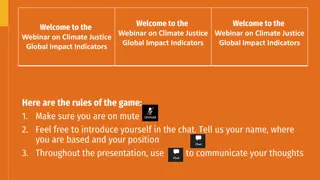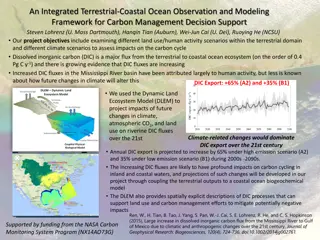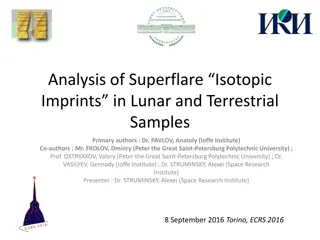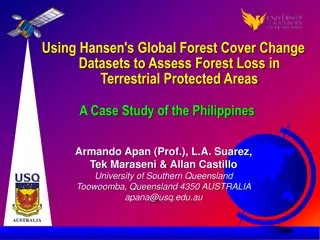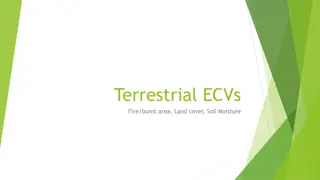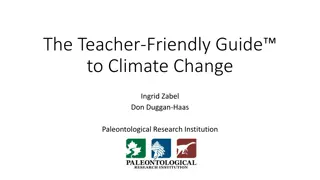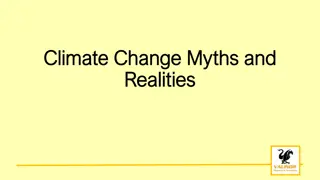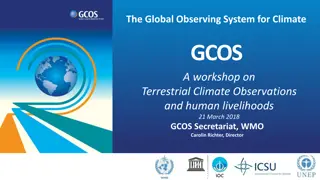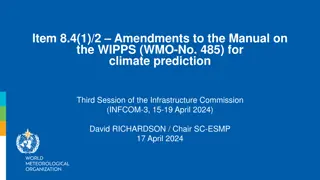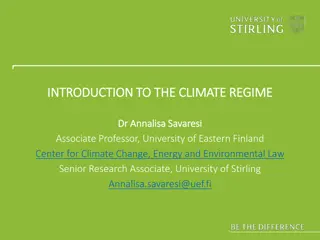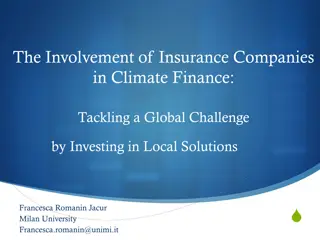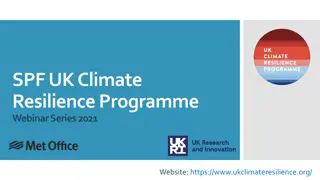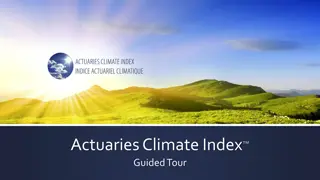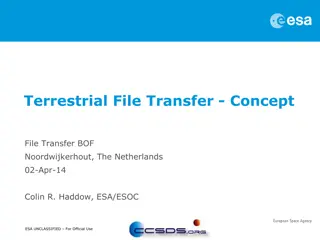Improving Health Amid Climate Change Challenges
Climate change has significant impact on health, requiring global sectors to act. Explore initiatives of the Ministry of Health in addressing climate-related health threats. Understand the interplay between climate change and health systems for a sustainable future. Learn the adverse effects of clim
4 views • 10 slides
An overview of solar influence on climate
The relationship between solar variability and Earth's climate is complex, with factors like the Sun's energy output, 11-year solar cycle, and regional differences playing a role. This overview delves into how solar influences interact with atmospheric and oceanic processes, such as the Sun's impact
6 views • 37 slides
Understanding Climate Change: Weather vs. Climate, Kppen-Geiger Classification, and Major Climate Zones
Explore the distinctions between weather and climate, delve into the Kppen-Geiger Climate Classification System, and discover major climate categories such as tropical climates. Gain insights into climate change and its impact on our environment.
8 views • 11 slides
Advancements in Solar-Terrestrial Research and Meteorology
The Solar-Terrestrial Centre of Excellence (STCE) focuses on ongoing activities and opportunities in the field of meteorology, with a special emphasis on Antarctica. Their annual meetings cover topics like water vapor feedback mechanisms, extreme weather events forecasting, cloud and precipitation s
0 views • 14 slides
National Climate Change Bill Overview
The National Climate Change Bill aims to establish an effective response to climate change in South Africa, promoting a transition to a low-carbon, climate-resilient economy. It focuses on coordinated actions, adaptive capacity enhancement, greenhouse gas management, and a fair global contribution.
8 views • 21 slides
Influence of Solar Activity and Orbital Motion on Terrestrial Atmosphere
Solar magnetic field reversal, wavelet spectral analysis, and proxies for solar activity index are discussed in relation to the joint effects of solar activity and solar orbital motion on the Earth's atmosphere. The study highlights the impact of solar cycles on terrestrial climate dynamics and temp
6 views • 16 slides
Regional Climate Modeling in CORDEX South Asia for Climate Change Research
This information details the regional climate modeling efforts within the CORDEX South Asia framework, focusing on high-resolution dynamical downscaling of CMIP5 climate projections. It highlights the activities, opportunities, and challenges for assessing regional climate change, along with future
4 views • 11 slides
Investment Responses to Biophysical Climate Impacts on Water, Energy, and Land in SDGs and Climate Policies
Investment assessments using Integrated Assessment Models (IAMs) are evolving to include biophysical climate impacts, assessing climate uncertainty on investments. The approach involves the MESSAGEix-GLOBIOM IAM, considering climate policy, SDG measures, and impacts under different scenarios. Climat
6 views • 32 slides
Gender-based Climate Change Litigation: A Key Solution?
Gender-based climate change litigation is emerging as a potential solution to address the disproportionate impact of climate change on different genders. Various international bodies have recognized the importance of integrating a gender-responsive approach in climate action to uphold human rights,
4 views • 12 slides
Proposal for Enhancing Security in RRC Connection Setup Procedure
Study the security mechanisms to secure the RRC connection setup process for the exchange of sensitive information between authentic network elements (BS and AMF) even before UE authentication. Addressing the lack of security in RRC Msg5 is crucial for various functionalities like Network Slicing an
1 views • 4 slides
Understanding Environmental Factors in Terrestrial and Aquatic Environments
Environmental factors play a crucial role in shaping ecosystems. In both terrestrial (land) and aquatic (water) environments, organisms are influenced by abiotic factors such as temperature, light intensity, and pH, as well as biotic factors like plants, predators, and competitors. Understanding the
5 views • 19 slides
Gender and Climate Change in Agriculture: Impacts and Adaptation Strategies
This workshop explores the intersection of gender and climate change in agriculture, emphasizing the importance of considering gender dynamics in adaptation planning. It covers the effects of climate change on men and women in agriculture, reasons for gender-sensitive adaptation planning, global and
0 views • 10 slides
Regional Project Proposal to Enhance Climate Resilience in Pakistan, Mongolia, and PRC
This proposal outlines a regional project focusing on enhancing climate resilience and agricultural productivity in Pakistan, Mongolia, and the People's Republic of China (PRC). The project aims to increase access to credit for smallholder farmers, promote climate-smart agriculture technologies, and
0 views • 12 slides
Challenges and Opportunities of Georgia's Digital Terrestrial Switchover
The transition to digital terrestrial broadcasting in Georgia posed challenges such as lack of strategy and clear vision in 2012, but also highlighted opportunities like civil society involvement and donor support. Contrasting government and civil society models for digital infrastructure ownership
0 views • 9 slides
Personal Rights in European Climate Litigation
Climate litigation in Europe focuses on individual rights and the shortcomings of traditional governance mechanisms in addressing climate change. The emergence of climate litigation as a crucial tool in governance is driven by the need to protect individuals and specific groups who are disproportion
0 views • 17 slides
Coupled Terrestrial-Coastal Modeling of Carbon Exchange in the Gulf of Mexico
Explore the interactions between terrestrial and coastal systems in the Mississippi-Atchafalaya Basin and Northern Gulf of Mexico through coupled terrestrial-coastal ocean modeling. The study focuses on carbon dynamics, uncertainties in coastal carbon budgets, and the NASA IDS project's approach. Fu
3 views • 26 slides
Adaptations and Characteristics of Mammals in Terrestrial Environments
Mammals are well adapted to various terrestrial conditions, inhabiting water, air, and soil. They maintain a stable body temperature, have fur for temperature regulation and protection, and unique limbs for different modes of movement. The distinguishing features of mammals include fur, specialized
0 views • 39 slides
Omnispace: Redefining Global Mobile Connectivity with 5G NTN Technology
Omnispace, launching in December 2022, introduces the world's first global hybrid mobile network using 5G NTN technology to revolutionize mobile connectivity for consumer, enterprise, government, and IoT users. The innovative 5G hybrid architecture combines global NGSO coverage and mobile network ro
0 views • 10 slides
Analyzing Systemic Climate Risk in the Financial Sector
This study discusses systemic climate risk in the financial sector by examining the effects of climate risks on financial institutions. It aims to design a market-based framework to assess the vulnerability of financial institutions to climate risks and analyze potential contagion effects. The frame
0 views • 39 slides
Climate Justice Global Impact Indicators Webinar - June 2023
Explore the Climate Justice Theory of Change, key definitions, impact indicators, and the importance of climate-relevant decision-making in this informative webinar. Gain insights on climate adaptation, resilience, and the effects of climate change, all aimed at empowering marginalized communities t
0 views • 27 slides
Integrated Terrestrial-Coastal Ocean Framework for Carbon Management
An advanced framework integrating terrestrial and coastal ocean observations and modeling is developed to support carbon management decisions. The study focuses on assessing the impacts of land use, human activities, and climate scenarios on the carbon cycle, particularly dissolved inorganic carbon
0 views • 5 slides
Analysis of Superflare Isotopic Imprints in Lunar and Terrestrial Samples
Researchers investigate isotopic imprints in lunar and terrestrial samples to understand extreme solar events and their impact on atmospheric radiocarbon concentrations. Using 10Be and 36Cl data, they analyze the solar proton spectra and energy fluxes associated with these events, shedding light on
0 views • 13 slides
National Priorities for Climate Change Science and Knowledge in Canada
Canadians are experiencing firsthand the impacts of climate change, including wildfires, heatwaves, floods, hurricanes, and droughts. To address these challenges, foundational climate change science and knowledge are essential for understanding our changing environment, identifying impacts, making i
0 views • 9 slides
Assessing Forest Loss in Protected Areas: A Philippines Case Study
The study assesses forest cover loss in terrestrial protected areas of the Philippines, analyzing the extent and rate of deforestation using Hansen's Global Forest Cover Change datasets. The research aims to understand the drivers of deforestation in protected areas, comparing forest loss in the ent
0 views • 24 slides
Understanding Climate and Its Impact on Earth
Exploring the fundamentals of climate, this comprehensive guide covers topics such as climate zones, climate formation, atmospheric composition, the role of CO2, ocean heat absorption, and circulation patterns. From the basics of weather and seasons to the significant impact of climate change, learn
0 views • 12 slides
Terrestrial ECVs: Fire, Land Cover, Soil Moisture Overview
Detailed examination of Terrestrial Essential Climate Variables (ECVs) focusing on fire monitoring, land cover analysis, and soil moisture assessment. The information encompasses product summaries, error characterization methods, outreach efforts, user statistics, planned activities for phase 2, and
0 views • 8 slides
The Teacher-Friendly Guide to Climate Change
The Teacher-Friendly Guide to Climate Change authored by Ingrid Zabel, Don Duggan-Haas, Robert Ross, and others explores topics such as climate measurement, natural causes of climate change, historical climate perspectives, and more. It delves into the significance of understanding past climates to
1 views • 12 slides
Climate Change Myths and Realities: Debunking Common Misconceptions
This content discusses common myths surrounding climate change and provides evidence-backed realities to debunk them. Topics include the pause in warming, natural climate variability, misconceptions about climate models, the impact of CO2 on plant life, and the consensus among climate scientists. Th
0 views • 6 slides
The Global Observing System for Climate and Terrestrial Climate Observations
The Global Observing System for Climate (GCOS) plays a crucial role in observing climate-related variables globally. Established in April 1992, GCOS focuses on what, how, and where to measure, sustain measurement, manage change, data transmission, management, rescue, and access. It addresses concern
0 views • 17 slides
Amendments to WIPPS Manual for Climate Prediction at INFCOM-3, April 2024
The document discusses amendments to the Manual on WIPPS for climate prediction, including new recommendations for weather, climate, water, and environmental prediction activities. It introduces concepts such as Global Climate Reanalysis and the coordination of multi-model ensembles for sub-seasonal
0 views • 10 slides
Future of ITU-D Study Question 8/1 Report Analysis
This report delves into the impact of terrestrial television broadcasting coexisting with telecommunication services, focusing on the transition to digital terrestrial television. It covers strategies for analogue switch-off, spectrum planning, and digital dividend use. The report also includes case
0 views • 16 slides
Climate Change Litigation in Aotearoa/New Zealand: LCANZI Action and Judicial Review
The Lawyers for Climate Action NZ Incorporated (LCANZI) are actively involved in climate change litigation in Aotearoa/New Zealand, including challenging government decisions related to climate responses. A notable case involved a judicial review against Auckland Transport, where the High Court refu
0 views • 6 slides
Understanding Weather and Climate Factors
Weather and climate are essential aspects of understanding the Earth's atmosphere. Weather refers to short-term atmospheric conditions, while climate represents long-term averages over 30 years. Factors influencing climate include distance from the equator, altitude, proximity to the sea, wind direc
0 views • 10 slides
Understanding the International Climate Regime and Governance
In this comprehensive overview, Dr. Annalisa Savaresi delves into the intricacies of the international climate regime, highlighting key aspects such as international climate law, major climate conferences like COP26, and the evolution of climate governance. The discussion covers important agreements
0 views • 27 slides
The Role of Insurance Companies in Climate Finance: Addressing Global Challenges through Local Investments
Exploring the engagement of insurance companies in climate finance, this presentation highlights the significance of private sector involvement in tackling climate change at a local level. It delves into key concepts such as mitigation, adaptation, and the global scientific targets for combating cli
0 views • 11 slides
UK Climate Resilience Programme Webinar Series 2021
The UK Climate Resilience Programme is hosting a webinar series featuring experts discussing climate resilience, adaptation strategies, and socio-economic pathways for the UK. Attendees can engage in presentations, Q&A sessions, and access recorded content post-event. Learn about the latest developm
0 views • 10 slides
C2.Link 5GHz Band Planning Overview
The C2.Link 5GHz Band Planning involves allocation to AM(R)S, AMS(R)S, and ARNS on a co-primary basis, with ICAO systems and MLS given priority. RTCA MOPS for a terrestrial C2 Link system and EUROCAE MOPS for a geostationary satellite-based system were released. The use of TDD waveforms in RTCA DO-3
0 views • 13 slides
Understanding the Actuaries Climate Index: A Comprehensive Guide
The Actuaries Climate Index (ACI) is an essential tool that measures climate risks using historical data collected since 1961. It focuses on extreme climate events and sea level changes, providing valuable insights into the impacts of climate change. By analyzing the ACI and its components, users ca
0 views • 18 slides
Terrestrial File Transfer Concept: Design Goals and Protocols
This document discusses the concept of terrestrial file transfer as presented in a series of slides from an ESA event in Noordwijkerhout, The Netherlands. It covers the purpose, design goals, protocols, and transport protocols involved in exchanging files between agencies for mission design, operati
0 views • 20 slides
Canadian Climate Change Policy from a Climate Ethics Perspective
Explore the ethical implications of Canadian climate change policy, delving into the necessity of meeting targets established in the Paris Agreement, the need for rapid decarbonization, and the availability of climate-safe energy alternatives. The presentation emphasizes the urgency of action to mit
0 views • 16 slides










